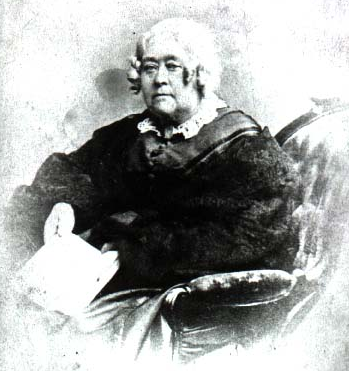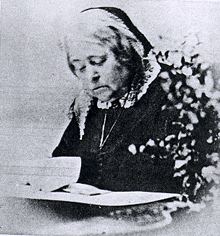<Back to Index>
- Educator Elizabeth Palmer Peabody, 1804
- Painter John Opie, 1761
- Governor of the Spanish Netherlands Cardinal Infante Ferdinand of Austria, 1609
PAGE SPONSOR


Elizabeth Palmer Peabody (May 16, 1804 – January 3, 1894) was an American educator who opened the first English language kindergarten in the United States. Long before most educators, Peabody embraced the premise that children's play has intrinsic developmental and educational value.
Peabody was born in Billerica, Massachusetts, on May 16, 1804. She was the daughter of Nathaniel Peabody, a physician, and spent her early years in Salem. After 1822 she resided principally in Boston where she engaged in teaching. She also became a writer and a prominent figure in the Transcendental movement. During 1834 – 1835, she worked as assistant teacher to Amos Bronson Alcott at his experimental Temple School in Boston. After the school closed, Peabody published Record of a School, outlining the plan of the school and Alcott's philosophy of early childhood education, which had drawn on German models.
She later opened a book store, Elizabeth Palmer Peabody's West Street Bookstore, at her home in Boston (ca.1848 - 1852). It was there that the "Conversations" were held, organized by Margaret Fuller. The first of these meetings between women was held on November 6, 1839. Topics for these discussions and debates varied but subjects were as diverse as fine arts, history, mythology, literature, and nature. Fuller served as the "nucleus of conversation" and hoped to answer the "great questions" facing women: "What were we born to do? How shall we do it? which so few ever propose to themselves 'till their best years are gone by". Many figures in the woman's rights movement took part, including Sophia Dana Ripley, Caroline Sturgis, and Maria White Lowell.
For a time, Peabody was the business manager of
The Dial,
the main publication of the Transcendentalists. In 1843, she noted that
the journal's income was not covering the cost of printing and that
subscriptions totaled just over two hundred. The publication ceased
shortly thereafter in April 1844.
- The advantage to the community in utilizing the age from 4 to 6 in training the hand and eye; in developing the habits of cleanliness, politeness, self - control, urbanity, industry; in training the mind to understand numbers and geometric forms, to invent combinations of figures and shapes, and to represent them with the pencil — these and other valuable lessons… will, I think, ultimately prevail in securing to us the establishment of this beneficent institution in all the city school systems of our country.
- Peabody died January 3, 1894, aged 89. She is buried at Sleepy Hollow Cemetery in Concord, Massachusetts.
Her sisters were painter Sophia Hawthorne (wife of writer Nathaniel Hawthorne) and writer Mary Tyler Peabody Mann (wife of educator Horace Mann).